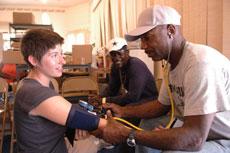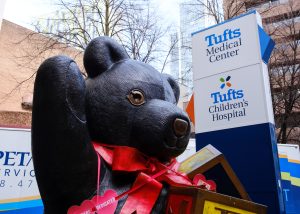Finding a Common Ground

Volunteers give medical assistance in New Orleans
May 21, 2006
Within the first week of the hurricane Katrina disaster, the organization Common Ground was quickly founded to provide immediate emergency relief for the hurricane victims and the community that was struggling to rebuild itself. It began as a grass roots movement that provided aid to the citizens of New Orleans, where state and federal support had failed. Left with very few resources to get by, members of the community as well as volunteer students, activists, and other humanitarians came together to build health car facilities, food and supplies distribution centers, first aid services, legal services, and Women’s centers all in the name of collective solidarity.
But now that families are beginning to return back to their homes, and often only the remains of their homes, the group has begun to shift some of its focus on more than just the short term needs. They are also concentrating on the long term rebuilding process that stands before them. Common Ground is very much still a grass roots organization, but as the next hurricane season quickly approaches the group has already expanded into a multi-programmed operation. Hurricane preparedness is not the only focus of groups like Common Ground, and now the group is on a campaign to spread their current aims and ongoing objectives in an effort to gain much needed continued support.
On May 5, in the fourth floor lounge of the Wheatley Building, an informal group gathered to talk about the issues that are still facing the families affected by the disaster in the gulf coast region, and how groups like Common Ground are providing aid. Emily Posner and Carolyn Campbell, two volunteers from Common Ground, came to UMass Boston to talk about the situation and to engage more people in these issues. Emily is a volunteer from Portland, Maine, but in the few months that she has spent working in Louisiana, she’s already developed a keen awareness of the racial and economic injustice that many saw as the underlying contributor to the extent of the hurricane Katrina tragedy. She emphasized that the participatory nature of Common Ground was a vital element in the rebuilding of New Orleans, and that the local community must use their strength in numbers to affect the government’s next steps in the city’s reconstruction.
“We need to meet these people’s needs so that once their short term needs are met, they can become involved in the political process,” said Emily.
Several of the audience members in attendance had family or were themselves from New Orleans and so the discussion stayed focused on many of the specific issues facing the citizens of the area. What was so surprising to many was how little information even former residents of New Orleans had on the current state of rebuilding the city, specifically on the current bulldozing of homes without proper notification to the homeowners. Since much of the city’s population has been displaced, contacting the proper owners has been difficult. Groups like Common Ground have been fighting for a moratorium on demolition until a more aggressive campaign to contact families has been completed.
Carolyn Campbell, who is a former evacuee from the Lower 9th ward, New Orleans, has returned to her community and is now working with Common Ground. She is experiencing first hand the difficulties in getting adequate aid from the government. After being forced to relocate several times since the disaster, due to complications from government assistance and harassment from landlords due to her temporary status, she now lives in a trailer on her brother’s front lawn. Carolyn expresses a lot of frustration towards the government, which she feels is still doing an in adequate job of providing aid for her community.
“The president ain’t doing nothing, the national government ain’t doing nothing,” explains Carolyn desperately. “Nobody is helping. It’s Common Ground and the college students and tourists who are donating their time.”
Through all that she has experienced, Carolyn remains optimistic. She gave a number of examples of how the strong sense of community and solidarity brought by the selfless grass roots direct action work of Common Ground has helped people like Carolyn cope with the other losses they have experienced. Carolyn began and ended the event by singing a song, which tapped into some of the deep emotions that she has endured during the events of the past few months. “When the storm of life rages, stand by me”, was the chorus.
Common Ground was founded by activist Malik Rahim, a veteran of the Black Panther Party and an organizer for housing rights in disaster site areas. Rahim’s background in activism put him in a position where he has already experienced dealing with many of the major issues that are facing the local community: issues of race and housing.
Carolyn explained that for a while the only “protection” that was being provided were groups of white vigilantes who rode around neighborhood in pickup trucks armed with guns with the objective of protecting private property. They were not there to help the stranded community, but instead were hostile to the struggling black citizens who were looking for basic human needs like food, clothing, and shelter. It is for reasons like this that Common Ground first came together.











































































